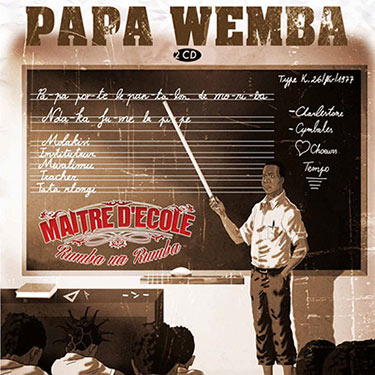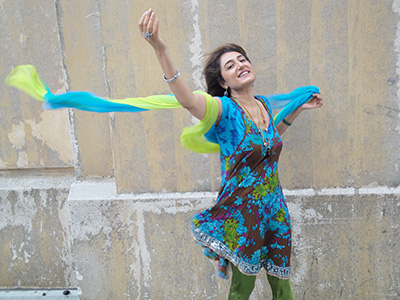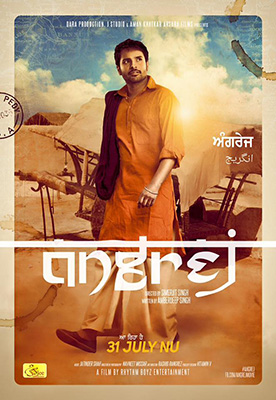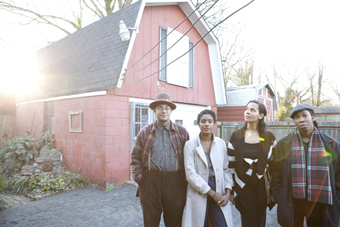 Album: Maître d?école(link)
Album: Maître d?école(link)
Artist: Papa Wemba
“I said to myself, I don’t want to play music only for Zaireans anymore. I am going to play music for all humanity.”
– Papa Wemba
The Inevitability of Musical Integration
First forays into world music are often accompanied by a prejudiced sense that we’re listening to the music of “that culture.” When we discover that the music of “that culture” is just as heavily influenced by foreign elements as is our own, we may become disappointed and demand music from a purer tradition.
This is a mistake; It’s in the very nature of music to seek out variety in its evolution, in the same way that nature seeks genetic diversity. It’s only the purists who try to prevent this quite natural process from happening, and an excessive clinging to tradition can put the kibosh on creative innovations that could drive the genre forward and keep it relevant. Think, for example, of Bill Monroe’s famous protective stance toward traditional bluegrass, which, ironically, he had invented by blending rural blues sounds with old-timey music.
Soukous as Main Course with a Side of Western Instruments
The good news is that most musical genres, however heavily influenced by outside forces, manage to retain a unique and distinctive core sound. The soukous genre in general (and Papa Wemba’s music in particular) is easily recognisable, and might be described as pulsing gushes of tinkling, joyful sounds in major keys?sounds that fade out only to be replaced by new sound surges. It’s the sound of a stubborn gladness, and Western instruments, languages, and stage costumes don’t water it down a bit.
Papa Wemba (born Jules Shungu Wembadio Pene Kikumba) is a Tetela tribe member from the Democratic Republic of the Congo (formerly Zaire). He says that his mother, a professional mourner who sang at funerals, was his greatest musical influence. The oldest boy in his family, he was obliged to care for his siblings after both parents died when he was still young.
Wemba insists that if his mother had lived, her influence and encouragement would have made his music even better, but It’s hard to imagine a more successful career. He’s made more than 40 albums and has a huge fan base in Africa and a burgeoning cult following in the West. He’s worked with Peter Gabriel, Eric Clapton, Stevie Wonder, Youssou N?dour, and Lucky Dube, among other notables, and has acted in two films.
Backlash From “The Man”
Wemba’s openness to Western culture was met with eagerness by young fans but ire from governing authorities fearing the demise of indigenous cultures. This compelled Wemba to add some more traditionally Congolese touches to his music, which he didn’t seem to mind. But Wemba’s embrace of European music, language, and dress was a kind of youthful rebellion that caught on like wildfire in his young audiences.
A Comforting Voice
It’s still hard to imagine how anyone could think of Wemba’s music as a threat to anything; his is the kind of warm, soothing voice that makes the monsters under the bed shrink and fade. In some of the slower numbers he makes a precious little flourish at the end of his phrases That’s absolutely heartwarming. The gorgeous choral harmonies are as marvelous as you could expect. You’ll hear a rich and harmonious blend of sax, guitars, accordion, and electronica, as well as African wind and percussion instuments. Some high points: the title track, “Ma Rosa”, “Africain comme toi, and Métamorphose.
It’s all quite 21st century, and it looks like there’s no turning back. Panic inspired by recent false rumours of his death at the age of 64 were dispelled when he immediately tweeted, Rest assured dear fans I am still here with you . . .
Maître d?école manifests four of the Mindful Bard’s criteria for music well worth a listen.
– It’s authentic, original, and delightful.
– It provides respite from a sick and cruel world, a respite enabling me to renew myself for a return to mindful artistic endeavor.
– It inspires an awareness of the sanctity of creation.
– It makes me appreciate that life is a complex and rare phenomena, making living a unique opportunity.


